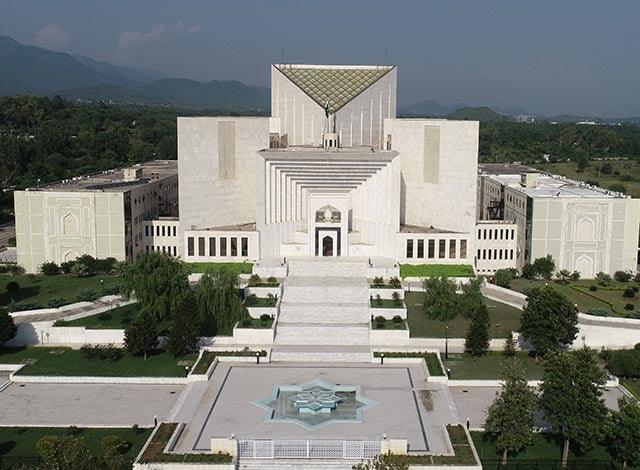The Constitution Bench of the Supreme Court of Pakistan on Wednesday sought clarification from the authorities as to why the Army Act was not applied in the cases related to the attack on the Army Public School (APS) in 2014.
The constitutional bench, headed by Justice Amin-ud-Din Khan, heard an appeal within the court challenging the decision to put civilians before military courts. Khawaja Haris appeared on behalf of the Ministry of Defense during the proceedings.
During the hearing, Justice Jamal Khan Mandokhail questioned the need to amend the constitution to allow military trials for terrorism, pointing to the existing nexus between civilian crimes and military courts, Express News reported.
He also asked why such trials were not conducted earlier, despite the existence of martial law.
Defense Ministry lawyer Khawaja Haris argued that the nature of the crime determines whether the trial is held in a civilian or military court.
He emphasized that if a civilian crime is linked to the armed forces, it falls under the jurisdiction of military courts.
However, Justice Mandokhail suggested that the intent of the perpetrator should be considered to determine whether the crime was against national interest.
Khawaja Haris clarified that military courts could try acts of terrorism linked to religious or terrorist groups under the Army Act, with or without constitutional amendments.
Justice Mandokhail inquired about the handling of important cases, such as the 2014 Army Public School (APS) attack, under the existing legal framework.
Khawaja Haris stated that the APS attack was linked to the military but was not directly tried under military courts.
He noted that the constitutional amendment covered additional crimes beyond military duty.
Judge Muhammad Ali Mazhar added that the court was focused on assessing the constitutional status of the law, not the nature of specific crimes.
Khawaja Haris argued that if the Supreme Court upheld Sections 21D and 2D2 of the Army Act, challenges to military courts should be dismissed.
The bench also referred to the 21st constitutional amendment, which allowed military trials for terrorism cases after the APS attack.
Justice Naeem Akhtar Afghan noted that the amendment had been the subject of parliamentary debate and applied legal reasoning, while Justice Hassan Azhar Rizvi noted the emotional context in which the amendment had been approved.
Khawaja Haris defended Parliament’s role in passing the amendment and acknowledged the crucial role played by former Senate President in its passage.
The Constitutional Court then adjourned the hearing until Thursday (tomorrow).



